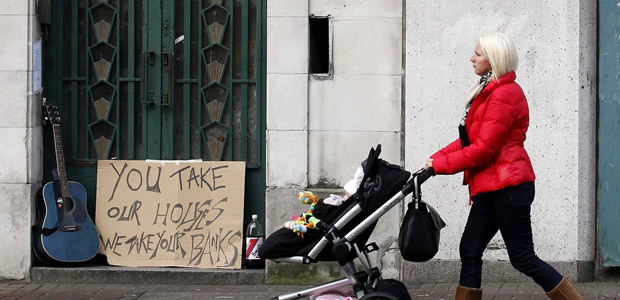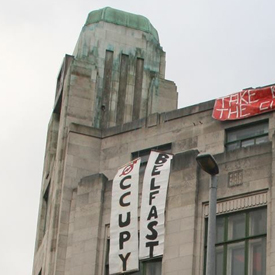An Occupy movement with a difference?
As a disused bank in Belfast is occupied in protest against the area’s housing problems, Channel 4 News asks whether an Occupy movement can bring about change – and why housing is of such concern.

Smoke alarms. Bins. Water. Paint brushes. Chalk. Extension leads. Light bulbs. No-one said squatting and activism went hand in hand with glamour.
This is part of the wish-list of Occupy Belfast as spelled out on their Facebook account: a list of tools, appliances and everyday essentials that the group needs to transform the old Bank of Ireland building, which it has recently occupied, into a social centre.
Floors have been swept, walls have been painted, and while the entrance is barred to prevent police entry, donations have been forthcoming.
“People have been dropping stuff in every day,” Sean Matthews, 27, one of the core members told Channel 4 News. “Sometimes just one passer-by, sometimes a dozen a day – it depends.”
Until two weeks ago, Occupy Belfast had been camping out in the city’s Writers’ Square – slightly hidden away from public view. But since taking over the former Bank of Ireland headquarters, the Occupy group has suddenly appeared on the forefront of public consciousness.
The art deco building on Belfast’s main shopping street had been lying vacant for almost a decade and is now decorated with Occupy Belfast banners, forcing people to take notice.
Read more: Where now for the Occupy protesters?
‘Take our houses: we take your banks’
Occupying this building holds a symbolic significance: the Bank of Ireland was rescued from collapse by Ireland’s taxpayers, who picked up the bill for a bailout worth billions of euros – similar to RBS in the UK.
But more than metaphor, Occupy Belfast has aims and local objectives – namely the rising problem of homelessness and repossessions. And while this is mainly a protest, it is also being billed as an attempt to provide a solution.
The Occupy Movement erupted on to global consciousness in October last year, as a reaction against rising unemployment, a sense of injustice about the world order, and as protest against corporate greed. Tangible solutions to “bread and butter” issues have not been the focus of the movement’s attention, however – perhaps in order to appeal to a global society.
I believe that it’s struck a chord with people. The building itself has provided that spark and momentum, and what’s important now is building on that and developing it. Sean Matthews
But this Belfast group says it wants to turn the ample space it has occupied into a community centre, where people with housing problems can find temporary respite. A banner inside the building reads “Affordable housing for everyone”, and rallies organised outside the city hall have focused on a lack of social housing, rising rents and forced evictions.
“I don’t think we should be held to ransom by slum landlords and property developers,” says Sean Matthews. “I believe that it’s struck a chord with people. The building itself has provided that spark and momentum, and what’s important now is building on that and developing it.”
It will become “a place for people who’ve become evicted, to be able to come and have a temporary space to stay,” says another of the dozen core members.

Rise in repossessions
Housing issues may be a convenient issue to champion when making a case to squat an empty building – something credible to give backbone to a bunch of activists, one of whom is homeless himself. But it is an issue that resonates huge concern in Northern Ireland.
The UK-wide Council of Mortgage Lenders told Channel 4 News that Northern Ireland has over double the number of existing mortgages subject to a repossession than England and Wales. In the third quarter of last year – the most recent comparable figures available – this applied to 0.5 per cent of all existing mortgages in Northern compared to 0.2 per cent in England and Wales.
In terms of the number of people this affects, the council predicts that 45,000 homes will be repossessed during 2012. Statistics from the Northern Ireland Court also chart a 104 per cent rise in the number of people who face losing their homes in Northern Ireland in the last five years.
We still have people who have experienced relationship breakdown or disability, but the marked change is working families struggling to get by, and that wouldn’t have been the case even three or four years ago. Nicola McCrudden, Housing Rights Service
Nicola McCrudden from the Housing Rights Service told Channel 4 News that demand for housing advice is going up steadily on a monthly basis: “In terms of mortgage advice service, demand has doubled – and there’s no sign of that demand decreasing at all.”
This independent organisation which provides support and information for people facing housing problems, have been granted extra government funding to deal with the increase in demand for its mortgage debt advice service.
“We still have people who have experienced relationship breakdown or disability, but the marked change is working families struggling to get by, and that wouldn’t have been the case even three or four years ago,” said Ms McCrudden.
She believes that the higher levels of economic inactivity, unemployment levels and the rapid decline in house prices from an all time time high, are all to blame. The hangover of the Troubles also looms large in Northern Ireland: the areas worst affected by conflict are also those with some of the highest rates of socio-economic deprivation, and some say have suffered from a lack of social development.
Or as Mr Matthews, a freelance journalist puts it: “The Good Friday Agreement hasn’t delivered for the people on the ground – unemployment in West Belfast is among the highest in the UK.”
Occupy ‘should be concrete’
Not everyone who seeks advice on their housing situation from the Housing Rights Service will end up on the streets – the organisation tries to ensure forced evictions happen in the rarest of cases.
But according to the charity Shelter, homelessness in Northern Ireland has been steadily rising over the last decade and has now reached a peak. Tony McQuillin, director of Shelter NI told Channel 4 News that the number of household classified by the government as “full duty homeless” has reached the highest ever since this classification was introduced in 1988.
We fear an even greater increase in homelessness, not only because of the recession which continues to cause home repossessions and low economic growth which is leading to increased unemployment, but also because of the government’s welfare reform initiative. Tony McQuillin, Shelter NI Director
“What is more disturbing is that we fear an even greater increase in homelessness, not only because of the recession which continues to cause home repossessions and low economic growth which is leading to increased unemployment, but also because of the governments welfare reform initiative,” he said.
In the short term at least, the housing protest has prompted a response, if not action, from the government’s social development minister.
“I am very aware of the pressure the current financial and economic situation is putting on families across Northern Ireland,” said Nelson McCausland, adding that his department spends £360,000 a year on a homelessness budget.
Can this protest bring about any actual change? It is still early days for Belfast’s burgeoning occupation. There are only a dozen core occupiers in the building for a start, even with the wider support that they claim to have. But it seems they are looking for inspiration to Spain, where rallies at proposed house repossessions have managed to deter authorities from evictions.
In protests elsewhere, the Occupy movement has become about battling for space: London’s protesters recently lost a legal battle to remain at St Paul’s Cathedral, while hundreds of protesters in New York were forcefully removed from Zuccotti Park.
“Myself, I believe that Occupy has to be built around something concrete,” Sean Matthews told Channel 4 News.
At the moment, Occupy Belfast is contributing to the debate and has the eyes and ears of local people – particularly because they are addressing a pressing issue of real concern. But as its members know themselves, achieving something concrete will be more of a challenge.